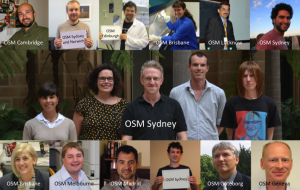[caption id="attachment_190" align="alignright" width="300"] The Open Source Malaria Team[/caption]
The Open Source Malaria Team[/caption]
Malaria is a disease that most of us are familiar with because of its devastatingly high death toll. According to the CDC, in 2010 an estimated 216 million cases of malaria occurred worldwide and 655,000 people died. To put that into some perspective, that’s approximately 1,550 people every day. While many groups are valiantly working on treating malaria or searching for a cure, they haven’t been consistently working together, which means many of the lab experiments are redundant.
Typically biomedical researchers do not share the details of their experiments (the lab notebook). That paradigm is changing with help from groups like Open Source Malaria, an international organization headquartered at the University of Sydney with active participants from all over the globe. The approach undertaken by this group of researchers is to transparently share information starting with the testing methodology through to the results. By open sourcing the lab notebooks, the group hopes to accelerate the sharing of knowledge and thereby the discovery of a cure.
We helped by creating a simple web site for Open Source Malaria with guidance from a few members of the team. This site describes their approach, acts as a portal to all of their openly available work, introduces you to the world-wide team, and describes how you can become involved.
Christine Peterson, who coined the term "open source," shared some thoughts with me for using the open source model for other disciplines. "The underlying concept of sharing the results of an intellectual endeavor has been used in other fields for a long time—so it was always assumed that these principles would be applied broadly, far beyond computer code alone. We needed a way to enable people to work together—either in an organized way or independently—to evolve better information products in a shared way." As another benefit, she noted, is that there is a lot of IP that goes to waste and open sourcing such projects could make the information available and useful to the world.
In the case of Open Source Malaria, they are doing more than just publishing a paper. They are working to engage the collective power of many to solve a world-wide health problem. There is much to do, and they welcome participation from both scientists and other disciplines. Visit the site, see if there is something you can add to their effort, and get involved.
If you have a project that would make the world a better place and need mobile or web applications, email me. stephanie@cloudcity.io. Cloud City would love to be a resource for you.